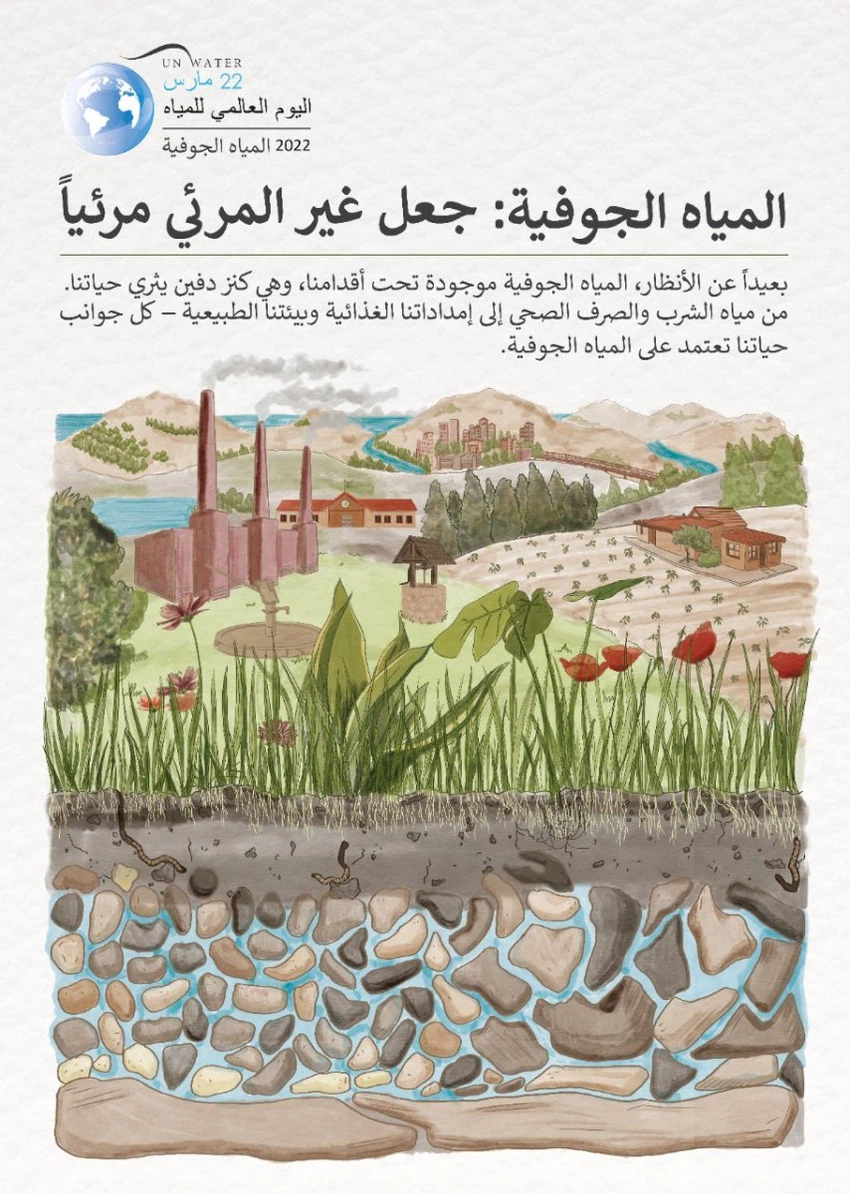On World Water Day 2022 - What is groundwater? And what is its importance?
Arab weather - most of the liquid fresh water in the world is groundwater, and although it is hidden underground water, it is a treasure that enriches our lives, and it may be the only source of water in the driest areas in the world, so groundwater was chosen to be the theme of the World Day. Water for 2022, with the aim of highlighting its importance and making the hidden treasure visible to the world.
World Water Day
The idea of this International Day dates back to 1992, the year in which the United Nations Conference on Environment and Development was held in the Argentine capital, Rio de Janeiro. In the same year, the General Assembly adopted March 22 of each year as World Water Day.
This day aims to raise awareness of the lack of access to safe water for more than two billion people. The occasion is also about taking action to address the global water crisis.
The main focus of the event is to support Sustainable Development Goal 6, which addresses the issue of universal access to water and sanitation by 2030.
World Water Day 2022 Logo
The theme of World Water Day 2022 focuses on groundwater under the slogan “ Ground Water - Making the Invisible Visible ”, which revolves around the idea that groundwater is not visible, but its impact is visible everywhere..

What is ground water?
Ground water is the underground water in aquifers, which are geological formations of rocks, sand, and gravel that can hold water. Groundwater feeds springs, rivers, lakes, and wetlands, and seeps into the oceans.
Groundwater is mainly fed by rain and snowfall that seeps into the ground. Groundwater can be extracted to the surface of the earth using pumps and wells.
What is the importance of ground water?
Groundwater is the source of nearly all of the world's running fresh water. There is no life without ground water. Most of the arid regions of the world are completely dependent on groundwater.
Groundwater provides a large proportion of the water we use for drinking, sanitation, food production, and industry. Groundwater plays an essential role in ensuring the proper functioning of ecosystems, such as wetlands and rivers.
Overexploitation of groundwater can lead to land instability and collapse, and in coastal areas, it can also lead to seawater intrusion into the ground.
Why should we care about groundwater?
The following are some of the challenges facing the world with regard to groundwater, which increases the need to pay attention to them:
- Groundwater is overused in many areas, as more water is extracted from aquifers than water is stored from rain and snow.
- Groundwater pollution is a particular problem that can take decades or even centuries to recover from.
- In some places, we don't know how much groundwater is beneath the surface of the earth we live on, which means we may fail to tap into a vital water resource.
- Exploration, protection and sustainable use of groundwater will be fundamental to survival, adaptation to climate change and meeting the needs of a growing population.
Groundwater quality and pollution
The potential threats to groundwater quality are two types of pollution:
- Natural (ie, geological) pollution: Two of the most prevalent geological pollutants are arsenic and fluoride. Millions of people on all continents are affected by the natural pollution of groundwater with arsenic. Therefore, the quality of groundwater must be regularly assessed and monitored.
- Human pollution: resulting from sources of pollutants resulting from land use and other human activities, and includes the effects of agricultural intensification, urban development, population growth, and climate change. For example, the quality of groundwater across Africa is affected by poor sanitation infrastructure and prevailing agricultural practices, resulting in high levels of nitrate and microbial contamination. In North America and Europe, nitrates and pesticides pose a major threat to groundwater quality: 20% of groundwater masses in EU countries exceed EU standards for good water quality due to agricultural pollution.
Most countries in the world share aquifers
Most of the large groundwater aquifers in the world cross international borders, and 468 transboundary aquifers have been identified around the world, which means that the vast majority of countries share groundwater resources. Globally, of the eight largest aquifers under water stress, six are transboundary. Some of them, such as the two aquifer systems in Nubia and the Northwestern Desert (which includes Egypt, Libya, Sudan and Chad), are not renewable.
In the past twenty years, much progress has been made in the basic assessment of transboundary aquifers, but examples of formal and structured cooperation among countries sharing groundwaters remain scarce. Of the more than 200 agreements analyzed on internationally shared rivers and lakes, only a few contained provisions relating to groundwater.
Currently, only a few transboundary aquifers are governed by international agreements. With the increasing use of groundwater resources worldwide, the need for specific and closer cooperation on transboundary groundwater is more evident than ever.
What can we do about groundwater?
Groundwater has always been of vital importance to humans and ecosystems, but its importance is not fully recognized. We must protect groundwater from pollution and use it sustainably, balancing the needs of people and the planet.
In the process of making sustainable development policies, we must highlight the centrality of groundwater in water and sanitation systems, agriculture, industry, ecosystems and climate change adaptation.
In the context of the global acceleration of the achievement of Sustainable Development Goal 6, particularly in the areas of innovation, governance, data and information, urgent action must be taken with regard to groundwater.
Arabia Weather App
Download the app to receive weather notifications and more..



